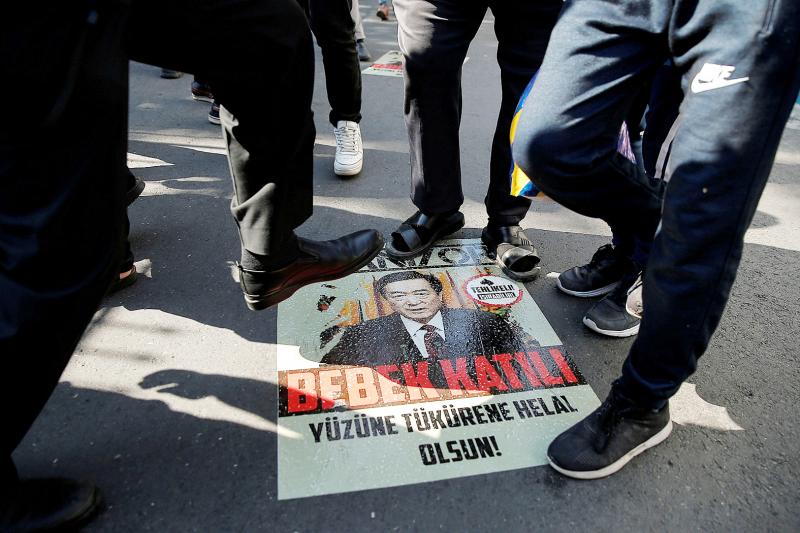China yesterday said it would impose tit-for-tat measures after the US slapped sanctions on Chinese officials for their involvement in a crackdown on Muslim minorities, raising tensions between the superpowers.
The two countries have traded barbs and sanctions on a slew of issues since US President Donald Trump took office, from trade to more recent spats over the COVID-19 pandemic, security legislation in Hong Kong, and Chinese policies in Tibet and Xinjiang.
The latest Chinese response followed a US announcement of visa bans and an assets freeze on three officials, including Chen Quanguo (陳全國), the Chinese Communist Party (CCP) chief in Xinjiang and architect of Beijing’s policies against restive minorities.

Photo: Reuters
“The US actions seriously interfere in China’s internal affairs, seriously violate the basic norms of international relations, and seriously damage China-US relations,” Chinese Ministry of Foreign Affairs spokesman Zhao Lijian (趙立堅) said in a briefing.
“China has decided to impose reciprocal measures against the relevant US institutions and individuals who behave badly on issues related to Xinjiang,” Zhao said, without providing details about the sanctions.
US Secretary of State Mike Pompeo on Thursday said that Washington was acting against “horrific and systematic abuses” in Xinjiang, including forced labor, mass detention and involuntary population control.
The back-and-forth over Xinjiang comes just days after the two countries imposed visa restrictions on each other over their disagreement on Tibet.
Chinese Minister of Foreign Affairs Wang Yi (王毅) on Thursday blamed the rising tensions on “McCarthy-style paranoia” in the US.
Witnesses and human rights groups say that China has rounded up more than 1 million Uighurs and other Turkic Muslims in Xinjiang in a vast brainwashing campaign aimed at forcibly homogenizing minorities into the nation’s Han majority.
Pompeo in a conference call with reporters on Thursday called the situation “the stain of the century” and has previously drawn parallels with the Holocaust.
Beijing said that it is providing education and vocational training in a bid to reduce the allure of Islamic radicalism following a spate of deadly violence.
The Uighur Human Rights Project, an advocacy group, hailed the sanctions and urged other countries to follow suit.
“At last, real consequences have begun. This comes at the 11th hour for Uighurs,” said the US-based group’s executive director, Omer Kanat.
The other two officials hit with sanctions were Wang Mingshan (王明山), the director of the Xinjiang Public Security Bureau, and Zhu Hailun (朱海侖), a former senior CCP leader in the region.
The US Department of the Treasury sanctions also make it a crime in the US to conduct financial transactions with the three people, as well as a fourth person, former security official Huo Liujun (霍留軍), who was not subjected to the separate visa restrictions.
The Treasury also imposed sanctions on the security bureau as an institution, pointing to its sweeping digital surveillance of Uighurs and other minorities.

SECURITY: As China is ‘reshaping’ Hong Kong’s population, Taiwan must raise the eligibility threshold for applications from Hong Kongers, Chiu Chui-cheng said When Hong Kong and Macau citizens apply for residency in Taiwan, it would be under a new category that includes a “national security observation period,” Mainland Affairs Council (MAC) Minister Chiu Chui-cheng (邱垂正) said yesterday. President William Lai (賴清德) on March 13 announced 17 strategies to counter China’s aggression toward Taiwan, including incorporating national security considerations into the review process for residency applications from Hong Kong and Macau citizens. The situation in Hong Kong is constantly changing, Chiu said to media yesterday on the sidelines of the Taipei Technology Run hosted by the Taipei Neihu Technology Park Development Association. With

CARROT AND STICK: While unrelenting in its military threats, China attracted nearly 40,000 Taiwanese to over 400 business events last year Nearly 40,000 Taiwanese last year joined industry events in China, such as conferences and trade fairs, supported by the Chinese government, a study showed yesterday, as Beijing ramps up a charm offensive toward Taipei alongside military pressure. China has long taken a carrot-and-stick approach to Taiwan, threatening it with the prospect of military action while reaching out to those it believes are amenable to Beijing’s point of view. Taiwanese security officials are wary of what they see as Beijing’s influence campaigns to sway public opinion after Taipei and Beijing gradually resumed travel links halted by the COVID-19 pandemic, but the scale of

A US Marine Corps regiment equipped with Naval Strike Missiles (NSM) is set to participate in the upcoming Balikatan 25 exercise in the Luzon Strait, marking the system’s first-ever deployment in the Philippines. US and Philippine officials have separately confirmed that the Navy Marine Expeditionary Ship Interdiction System (NMESIS) — the mobile launch platform for the Naval Strike Missile — would take part in the joint exercise. The missiles are being deployed to “a strategic first island chain chokepoint” in the waters between Taiwan proper and the Philippines, US-based Naval News reported. “The Luzon Strait and Bashi Channel represent a critical access

Pope Francis is be laid to rest on Saturday after lying in state for three days in St Peter’s Basilica, where the faithful are expected to flock to pay their respects to history’s first Latin American pontiff. The cardinals met yesterday in the Vatican’s synod hall to chart the next steps before a conclave begins to choose Francis’ successor, as condolences poured in from around the world. According to current norms, the conclave must begin between May 5 and 10. The cardinals set the funeral for Saturday at 10am in St Peter’s Square, to be celebrated by the dean of the College